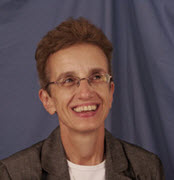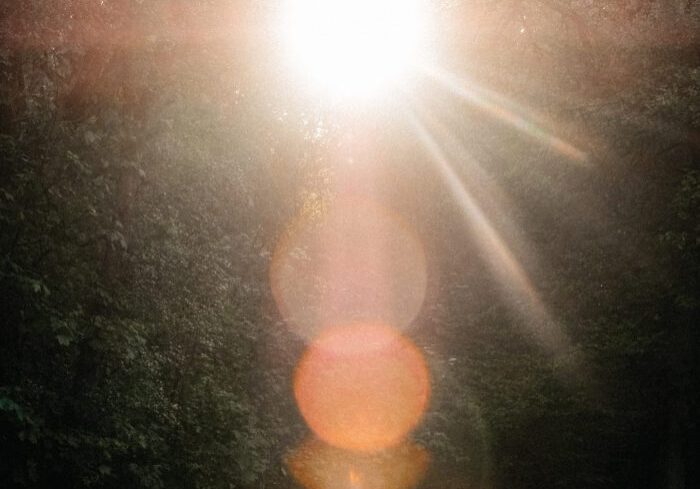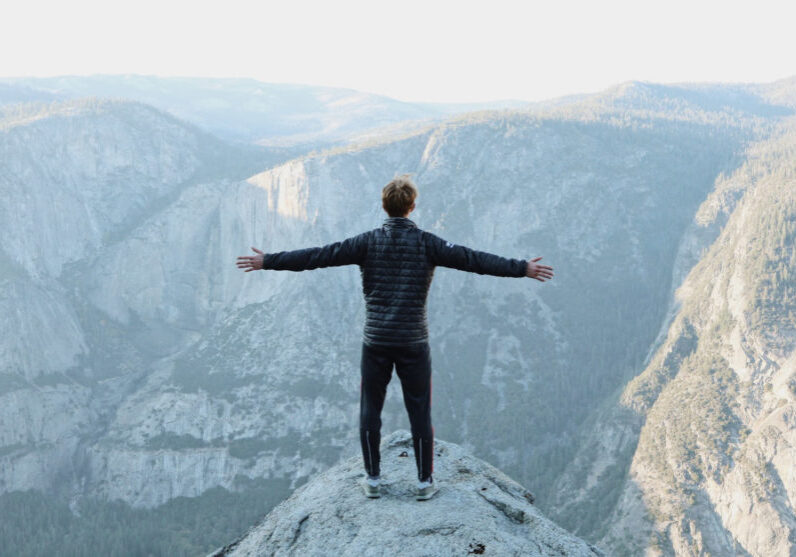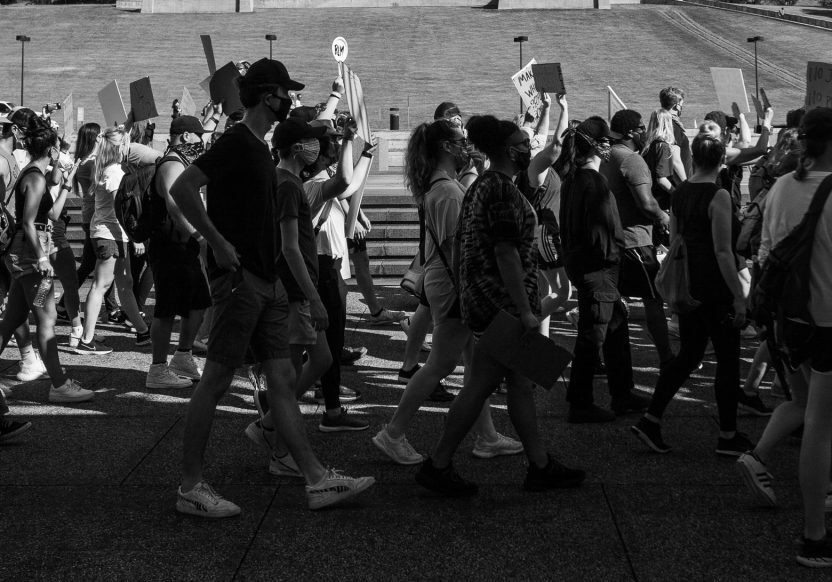Theistic Evolution: A New Religious Story
Q: “… We are the universe becoming conscious of Itself. There is an energy within (God/Agape) drawing us (and everything) forward and upward in a rise in consciousness towards greater and greater being… Jesus is that Energy, drawing the universe forward and upward towards greater and greater consciousness, fully manifest in the human person and because Jesus existed, His consciousness is our consciousness. His death is our death. His resurrection is our resurrection. He draws all up and forward with Himself because we are not separate but one … So what are we doing here? What is this day about? …”
 Ilia: When I was growing up in the seventies and eighties, no one questioned religion (at least not in northeast New Jersey). Catholicism was a given and religion seem to be divinely ordained. Religion was not something to understand; it was a basket of core beliefs. To this day understanding religion and its relationship to culture and science is a difficult topic for most people. The Church is mother and teacher (mater et magistra) and to question the core elements of faith can lead one into error. This type of thinking worked in the last few centuries when little information was available and the Church wielded unbridled power and authority. Today, the ubiquity of the internet and the availability of information through various means of communication have loosened the grip of the Church’s power over religion. The rise of information has allowed a new breadth of understanding to emerge across congregational divides. We are beginning to realize the Christian story in a whole new light as religion interacts with culture and science.
Ilia: When I was growing up in the seventies and eighties, no one questioned religion (at least not in northeast New Jersey). Catholicism was a given and religion seem to be divinely ordained. Religion was not something to understand; it was a basket of core beliefs. To this day understanding religion and its relationship to culture and science is a difficult topic for most people. The Church is mother and teacher (mater et magistra) and to question the core elements of faith can lead one into error. This type of thinking worked in the last few centuries when little information was available and the Church wielded unbridled power and authority. Today, the ubiquity of the internet and the availability of information through various means of communication have loosened the grip of the Church’s power over religion. The rise of information has allowed a new breadth of understanding to emerge across congregational divides. We are beginning to realize the Christian story in a whole new light as religion interacts with culture and science.
It is hard to get one’s head wrapped around the idea that religion is not fixed but emerges out of complex structures of human understanding and consciousness and coincides with the rise of personal autonomy and transcendence. The great religion scholar Mircea Eliade wrote eloquently on myth as a story that conveys deep truths of existence through narrative, symbol and metaphor. Christianity is a myth insofar as the story of Jesus’s life, death, and resurrection was constructed by the early Christians based on oral stories passed down in local communities.The earliest Christian writings can be found in the writings of Saint Paul and the Gospel of Mark. The Gospels of Luke and Matthew relied on Mark and other unknown sources to form their narratives for their respective communities. Stories belong to communities and the Gospels are stories of Jesus’s life, death and resurrection shaped for different communities.
Theology is a complex discipline that builds on biblical scholarship as well as historical scholarship, philosophical understanding and the natural sciences. The doctrines of the Church did not drop down from heaven; they were not prepackaged or pre-formed. They were developed over long periods of time, sometimes several centuries, before being adopted by the Church as official teaching. The doctrine of the Incarnation, for example, emerged as a topic of heated discussion in the late third and fourth centuries provoked by the political battles between those who said that Jesus was not truly divine but the first born son of the Father and those who said that Jesus was truly God, otherwise there can be no true salvation. Once the Council of Nicea proclaimed that Jesus is truly God (and not the first born Son of God, as Arius suggested), the question became, how can human nature be united to divine nature? The question of “nature” itself became a topic of heated discussion, as did the notion of “person.” What is a “person?” Theologians looked to Greek philosophy, especially Aristotle and Plato, to understand the meaning of nature and personhood. But it took another century for the doctrine of the incarnation to be formulated because it was unclear how natures were united. Once again theologians turned to Aristotle and Stoic philosophy to understand the unity of natures. Every time theologians looked to philosophy, they were looking to natural science, since philosophy in the ancient period was based on observation of the natural world. The doctrine of the incarnation reached a formal definition at the Council of Chalcdon in 451 but discussion on the person of Jesus Christ (for example, did Jesus have one will or two wills?) would continue in subsequent centuries. The interesting thing about theology in the early Church is that everyone seemed to have an opinion about the hot topics of faith. Gregory of Nyssa wrote a well-known passage on how talk of the Trinity was a social topic in the fourth century:
“Everywhere, in the public squares, at crossroads, on the streets and lanes, people would stop you and discourse at random about the Trinity. If you asked something of a moneychanger, he would begin discussing the question of the Begotten and the Unbegotten. If you questioned a baker about the price of bread, he would answer that the Father is greater and the Son is subordinate to Him. If you went to take a bath, the Anomoean bath attendant would tell you that in his opinion the Son simply comes from nothing.”
We know so little of the history of theology because we left it to the authority of the Church to mandate knowledge of faith. What the Church (both Catholic and Protestant) never made known, however, is that science played a critical role in the shape of theological doctrine, at least up to the Middle Ages. The relationship of faith and science was not questioned until after the High Middle Ages when the power of observation was enhanced by the invention of the telescope (following the invention of concave and convex lenses–basically no one wore glasses prior to the Middle Ages.) The confirmation of the Copernican system by Galileo, who had a powerful telescope to view the heavens and a powerful mind to measure the movement of the planets, and the condemnation of Galileo by the Church in 1633, marked a watershed; theology retreated from the natural world of observation and experience. Joshua Moritz points out in his book on Science and Religion that the Galileo affair occurred around the time of the Reformation, and the Church perceived Galileo in the same light as the Reformers, as one who challenged the authority of the Church. The Church emphasized revelation based on Scripture and biblical interpretation rather than the Book of Nature or the natural world while science and philosophy developed their own methods and bodies of knowledge– without theology. The unitive relationship between macrocosm (cosmos) and microcosm (person) in the Middle Ages became problematic and divorced in the modern period.
What we have today are three loosely related disciplines (theology, philosophy, science), each with its own methods, language and concepts. Instead of having a cosmo-religious myth to provide guidance, meaning and purpose to human life, we have independent myths of science, religion and philosophy, each myth competing for power to define and direct human existence. Without a common narrative, however, we have no story that binds us together. Hence the need today to construct a new myth or story is urgent, especially since modern science and the Big Bang theory indicates a common origin. The irony of the new myth today is not that it is novel and unorthodox; rather it is a return (in a sense) to the original cosmotheandric myth that dominated early Christian life in which theological meaning was deeply connected to the whole of nature and to the human person as part of nature. The word “catholicity” adopted in the second century to connote a consciousness of the whole with Christ as center, takes on new meaning today. The work of Teilhard de Chardin builds on this search for the whole in our dynamic world of evolution. His profound insights help us realize that the new cosmos story demands a new understanding of God, and a new understanding of ourselves in relation to God and to unfolding life. Faith believes not in what is seen but in what is unseen, not what is known but what is unknown so that the mind may stand in the heart, and the heart may be open to the great mystery of God. Here are some fundamental principles:
- Creation and Creator are related; hence theology cannot adequately talk of God apart from science
- The human person is part of nature and thus cannot be known apart from science
- Evolution is the best description of nature today; hence evolution is the best framework for theology
- Nature is not fixed or static; hence, knowledge of God cannot be fixed or static
So, yes Craig, your summary of this new narrative is correct but challenging. As you write: “We are the universe becoming conscious of itself which means that the basic elements of our bodies, for example, carbon, nitrogen, hydrogen, is formed from the stuff of the cosmos. There is an energy within us (God/Agape) drawing us (and everything) forward and upward in a rise in consciousness towards greater and greater being. We are not separate little billiard balls but a river of Being pouring forth and being expressed in, through and as unique and particular waves. While we seem to be stuck on the surface of things, perceiving from the tips of those waves (egoic consciousness) and viewing that which we are as separate and static, as we travel within through some form of contemplative practice, we discover that we are all expressions of the whole, a whole that is moving and flowing towards something greater. As we move toward the whole, we become not just waves but part of the River itself, as we become ever more conscious of the truth that is the light within and around us. Darkness and fear stifle evolution.
As we let go of our many “selves,” selves by which we define reality and retreat into, we become open to the flow of energy moving everything towards ever greater consciousness, ever greater awareness of oneness. My neighbor begins to emerge as he or she truly is, part of my very Self, the shared Self. The energy that opens my eyes to see the other as part of myself and myself as part of the other connects us together, as I begin to see with the “eyes of God.”
Jesus is that divine-human entangled energy, drawing the universe forward and upward towards ever-greater consciousness, fully manifest in the human person. Because Jesus was truly human, his consciousness is our consciousness; his death is our death; his resurrection is our resurrection. He draws all toward himself and forward with himself because we are in truth, one Body. So what are we doing here? What is this day about? We are here to evolve, to participate in the birthing of God, to become the light-filled consciousness of God, the same light that coincides with the unfolding Universe. By entering into higher levels of consciousness and love, we let go of our private, static, separate selves in order that the energy at the heart of everything—God-Omega– might be made manifest in us and through us, drawing us out of self-preservation into self-becoming, which is really the becoming of our truest selves in God and God in us. This is Christogenesis, as Teilhard envisioned it.
*Painting by Craig Irving
 View print-friendly version
View print-friendly version
2 Comments
Related Posts

A Whiteheadian Response: The God of Persuasion
Question: “Please help me to further understand, I thought that God did not direct our lives. We made choices, those choices CREATED—God’s presence is in the creation of the choice…


[…] was inspired by Ilia’s kind reply to my question in Theistic Evolution: A New Religious Story, and also by a scene from the third Indiana Jones movie in which the hero stands on one side of an […]
Thank you, thank you, thank you Ilia! This serves as a wonderful synthesis of today’s challenges for those trying to pass on the faith in a relevant form.